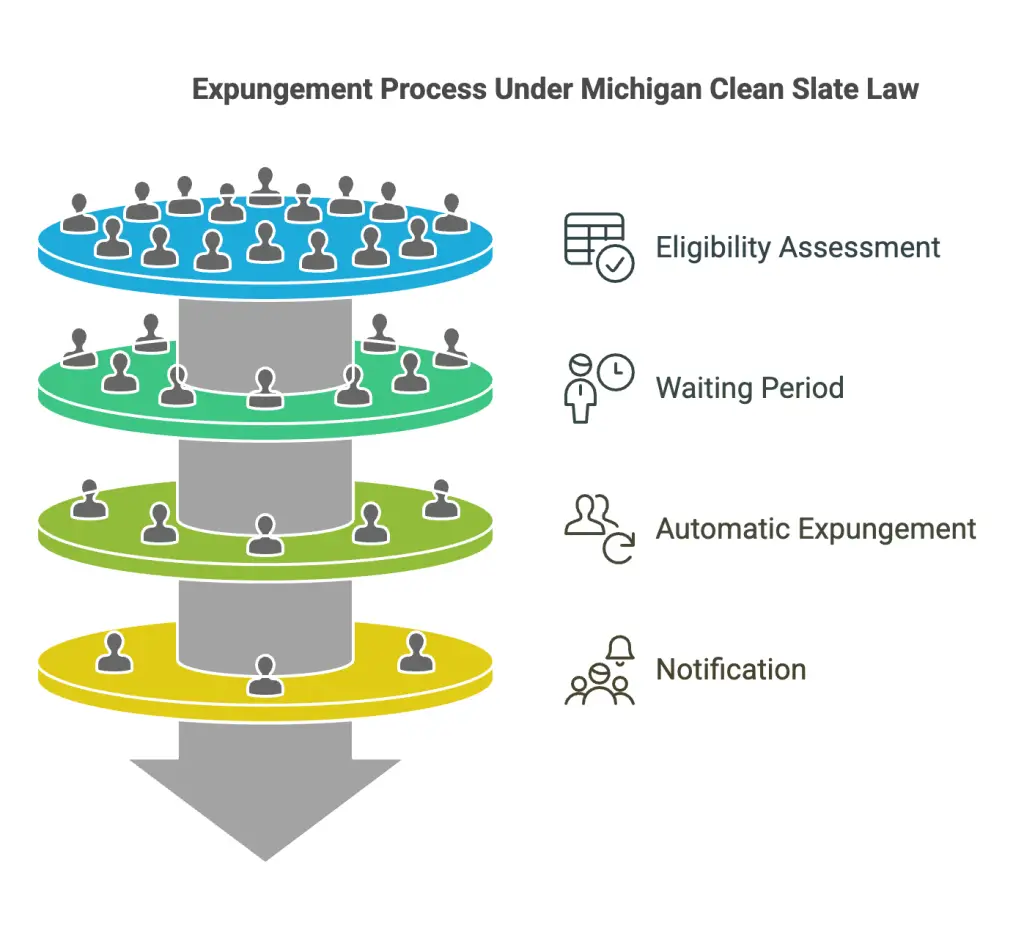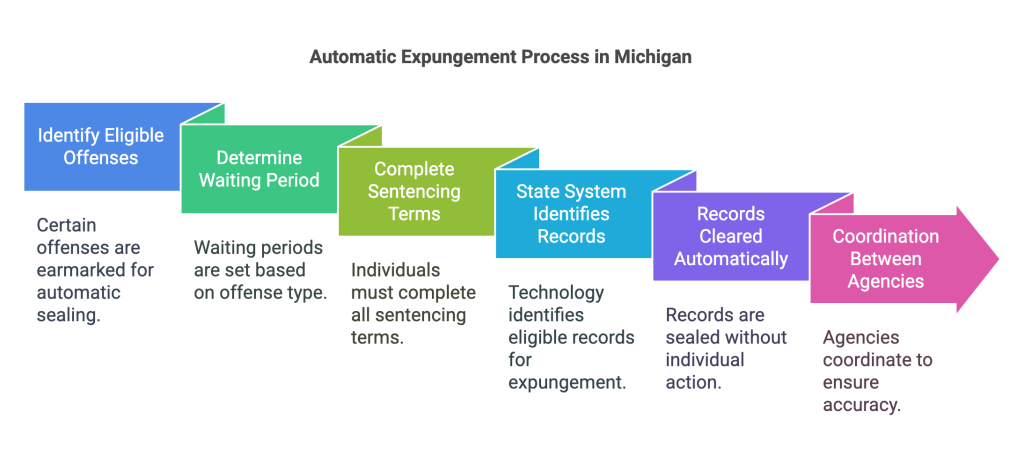The stigma of a criminal record can cast a long shadow over one's life, affecting employment opportunities and personal freedom. Fortunately, Michigan has taken significant steps to address this through its Clean Slate Law, which aims to provide a fresh start for many residents.
This guide will delve into Michigan's Clean Slate Law, focusing on the automatic expungement process, how it impacts hiring practices, and the broader implications for individuals seeking employment. We'll cover eligibility criteria, how the law integrates into current and future hiring protocols, and answer common questions. Let's explore how Michigan's legislative changes could potentially transform lives and rebuild futures.
Key Takeaways
- Michigan's Clean Slate Law automatically expunges certain criminal records, helping individuals move forward without the burden of the past.
- Automatic expungement eliminates the need for individuals to apply, simplifying the process and removing barriers to employment and housing.
- Eligible offenses for automatic expungement include less serious misdemeanors and non-violent felonies, while serious crimes remain ineligible.
- This law prompts employers to update hiring practices as background checks may no longer show expunged records, enhancing fairness in employment.
- The Clean Slate Law fosters opportunities for a more inclusive workforce, allowing rehabilitated individuals to contribute positively to society.
Introduction
Imagine losing out on a dream job because of a mistake from years ago. Unfortunately, that's a reality many face due to criminal records. Studies show that a criminal record can cut job callbacks by over 50%. However, Michigan's Clean Slate Law offers a new path. It was designed to help erase certain convictions automatically, allowing individuals to seek new opportunities without the weight of the past.
Michigan's legislative action aims to clear the path for a fresh start. The Clean Slate Law enables eligible individuals to have their criminal records expunged without the hassle of lengthy applications. This law targets reducing the barriers that a record can create, both socially and professionally.
This guide is crafted to help you understand the ins and outs of Michigan's Clean Slate Law. You'll learn how automatic expungement works, its impact on hiring, and what it means for those looking for employment. Dive in to see how these changes might change the landscape for job seekers in Michigan.
Understanding the Michigan Clean Slate Law
The Michigan Clean Slate Law is designed to give individuals with criminal records a chance to start anew by erasing certain parts of their past. This law allows for automatic expungement of eligible criminal records, meaning that the records are set aside from public view without requiring individuals to file an application. Its primary goal is to reduce the barriers associated with having a criminal record, particularly when it comes to employment and housing.
The legislative journey for this law began amidst growing evidence that criminal records significantly hindered former offenders' ability to reintegrate into society. Lawmakers recognized that many people with past convictions faced lifetime penalties that disproportionately affected people of color and low-income communities. The process included input from legal experts, community organizations, and stakeholders who understood the long-term effects of maintaining an accessible record.

Key provisions of the law include types of offenses eligible for automatic expungement and the criteria these records must meet. For example, certain misdemeanors can be expunged automatically after a clear period, while non-violent felonies might require a longer waiting period. The law specifies limitations, such as the ineligibility of serious offenses like assault or sex crimes for automatic expungement. It also outlines the state's responsibility in notifying individuals whose records are expunged under this law. This ensures both transparency and accountability in the process.
With this legal framework, Michigan leads by example in balancing public safety with opportunities for rehabilitation and redemption. As you consider the implications of the Clean Slate Law, think about how it might affect hiring practices or create new avenues for those who have paid their dues. Can the law shift societal attitudes toward former offenders, or might barriers persist despite these legal advancements?
Automatic Expungement: How It Works
Automatic expungement streamlines the process of clearing eligible criminal records in Michigan. Under the Clean Slate Law, certain offenses are earmarked for automatic record sealing, meaning the individual doesn't need to take any action. This includes misdemeanors and specific felonies unconnected to discharge or serious violations. The goal is to ease the burden on individuals who may lack the resources or knowledge to pursue expungement actively.
The timeline to automatic expungement begins after the required waiting period, which varies by offense type. For misdemeanors, it typically spans seven years from the date of conviction. For eligible felonies, the period is longer, at ten years. The clock also depends on the completion of any required sentencing terms, including incarceration, probation, or parole.

Automatic expungement differs significantly from the voluntary application process. With voluntary expungement, individuals must file a motion in court, pay fees, and appear before a judge. They must meet more stringent criteria, and not all offenses are eligible. Automatic expungement, by contrast, relies on technology to identify and clear records without the person's active involvement, simplifying their path to a fresh start.
This passive process hinges on a robust state system capable of identifying eligible records correctly. It requires coordination between state law enforcement agencies and courts to ensure accuracy and efficiency. As more states consider similar measures, Michigan's model could serve as a blueprint for making second chances accessible to more citizens.
Eligibility for Expungement in Michigan
To see if your record qualifies for expungement under Michiganâs Clean Slate Law, you'll need to check a few specific boxes. The law aims to help individuals move past certain convictions, but not all offenses are covered.
First up, letâs talk numbers. Generally, you can expunge up to two felony convictions and four misdemeanor convictions. Itâs crucial to understand what qualifies. Felony convictions generally pertain to non-violent and lower-risk offenses. Misdemeanors eligible for expungement are more lenient, but serious offenses are often excluded.
Now, the exclusions. Crimes not eligible for automatic expungement include serious felonies like sexual offenses, crimes involving minors, and serious assaultive crimes. Convictions for life offenses or traffic offenses like Driving Under the Influence (DUI) also donât make the cut.
Timing plays a role too. For most misdemeanors, you must wait seven years after your conviction or release (whichever is later) before automatic expungement. Felonies require a ten-year wait.
Have a mixed record with one serious offense? A separate application for manual expungement might still be an option, although it involves a different process and scrutiny.
Understanding these rules can guide you on whether automatic expungement is feasible. It's a chance to clear the path for your future. Have you reviewed your record recently? Knowing the details is the first step toward a fresh start.
Hiring Implications of the Clean Slate Law
Employers in Michigan need to navigate the Clean Slate Law carefully. With the advent of automatic expungement, background checks might not reveal past convictions that are legally erased. This demands an update in how you approach hiring.
First, understand that automatic expungement does not remove every type of offense. But it broadens the pool of candidates without a shadow of a criminal record. You might encounter applicants with past offenses that donât show up in traditional background checks. This means revisiting your criteria for evaluating candidates.
Align your hiring practices with EEOC Guidelines. The guidelines emphasize evaluating the nature of past offenses, their relevance to the job, and the time elapsed. Incorporate these aspects when assessing applicants with criminal records. Itâs also beneficial to train your hiring teams on these new legal norms to ensure compliance and avoid any discriminatory practices.
Positively, this law aids in building a diverse workforce. A broader candidate pool can offer you a range of skills and perspectives that might be overlooked if strict barriers are in place. Greater diversity often translates into innovation and better problem-solving, assets to any company.
Are you prepared to adjust your hiring process in light of these changes? Doing so may not only ensure compliance but also bring in talents that elevate your organization.
Potential Challenges and Considerations
Employers have mixed feelings about the Clean Slate Law. One common concern is the clarity and access to sealed records. While these records are not supposed to be part of a background check, employers worry about the unknowns. They may question the completeness of candidate backgrounds, which can impact hiring decisions.
From an applicant's view, the process holds both promise and hurdles. You might see sealed records as a key to new opportunities, but old stigmas can linger. Proving your suitability for a role involves more than a clean slateâit requires showcasing current skills and dependability.
Despite records being sealed, societal perceptions shift slowly. Some employers, consciously or unconsciously, may still view expunged records with skepticism. This brings another layer for job seekers aiming to navigate post-expungement challenges while advocating for their potential without prejudice.
Building awareness among employers and supporting applicants is crucial. By fostering better understanding and clearer guidelines, individuals and businesses can both benefit from Michiganâs legislative changes. How can you, as an employer or job seeker, take steps to adjust to these new dynamics?
Legal Perspectives and Rights
Understanding your rights under the Clean Slate Law is crucial if you have expunged records. Once your record is expunged, you have the legal right to omit it when asked about arrests or convictions by an employer. This could significantly level the playing field in job applications, giving you a fair shot without the burden of past mistakes looming over you.
However, inaccuracies in background checks can still occur. It's your right to ensure your record reflects your current status accurately. If errors appearâthat is, if a sealed or expunged record shows up in a checkâyou have the grounds to contest it. Contact the background check company first. They are legally obligated to investigate your claim. If they don't resolve it, organizations like the Fair Trade Commission can assist further.
For those navigating the expungement process, seeking legal assistance can clarify your rights and options. Non-profit organizations like the Michigan Justice Fund provide guidance during this process. They help with understanding your rights and offer resources to efficiently address any inaccuracies. It's empowering to know that resources exist to support your journey towards a fresh start.
Conclusion
Michiganâs Clean Slate Law is a step in the right direction for those with criminal records. By enabling automatic expungement, it reduces barriers to employment and opens doors to new opportunities. Key points discussed include eligible offenses for expungement, the distinctions between automatic and voluntary expungement, and how this law affects hiring practices.
Looking ahead, the law has the potential to reshape Michiganâs job market. With a larger pool of qualified candidates, businesses can benefit from increased diversity and a broader range of talent. As communities and industries grow to include more rehabilitated individuals, the societal impact could be significant.
If you're considering expungement, take heart in the resources available to guide you. Organizations and legal aids can provide the support you need. Embrace this chance for a fresh start and explore the possibilities that come with it.
Resources
- GCheck Blog: Visit GCheck Blog for expert insights and detailed articles on employment background checks, including updates on expungement laws across varying states. This can be a helpful resource for both employers and job seekers navigating the post-expungement job market.
- State of Michigan Clean Slate Information: Access comprehensive information on Michigan's Clean Slate Law directly from the State of Michigan website. Here, you can find detailed eligibility criteria, application forms, and further guidance on the expungement process.
- Legal Aid and Assistance: Connect with organizations like Legal Aid of Michigan for pro bono legal support and advice. They provide services to individuals looking to understand their rights and options regarding expungement.
- National Employment Law Project (NELP): Explore NELP's resources for broader context on employment rights, background checks, and various state-level laws affecting workers with criminal records.
- Expungement Services: Consider reputable services such as Expungement.com for those seeking professional help to understand their eligibility and complete necessary paperwork for expungement.
- Equal Employment Opportunity Commission (EEOC): Familiarize yourself with guidelines and rights as outlined by the EEOC to ensure compliance and understanding in hiring practices post-expungement.
These resources are valuable tools for navigating the complexities of the Clean Slate Law and should equip you with the necessary knowledge and support.
Frequently Asked Questions (FAQs)
What crimes are sealed under MI Clean Slate?
Michigan's Clean Slate law allows for the sealing of certain non-violent misdemeanors and some felonies. Serious offenses such as felonies punishable by life imprisonment, crimes with penalties of 10 years or more, and certain assaultive crimes are not eligible.
Can employers see sealed records in Michigan?
Once a record is sealed, most employers cannot view it. However, law enforcement and certain federal agencies may still access sealed records.
How to check if your MI record is sealed?
Contact the Michigan State Police Criminal History Record database. You can request a background check on yourself to verify if your records have been expunged.
Does Clean Slate apply to DUI convictions?
No, DUI (OWI) convictions are not eligible for automatic sealing under Michigan's Clean Slate law.
How long does automatic expungement take in MI?
Automatic expungement generally takes about seven years for eligible misdemeanors and ten years for eligible felonies after the completion of the sentence.
Are misdemeanors sealed automatically in Michigan?
Yes, certain misdemeanors can be sealed automatically if they meet specific criteria and the waiting period has passed without further offenses.
Can sealed records be used for healthcare jobs in MI?
Some healthcare positions require background checks. If the job involves children, the elderly, or vulnerable adults, your sealed record might still be accessed.
How to dispute a sealed record error in MI?
Contact the court where your record was processed. Provide documentation that supports your claim. You may also want to consult a lawyer for legal advice.
Do MI employers have to ignore sealed records?
Yes, employers in Michigan must ignore sealed records for most employment opportunities unless exceptions apply such as federal or other regulated employment.
Does Clean Slate apply to federal jobs in Michigan?
Federal jobs are subject to federal background checks where sealed records might still be accessible. Clean Slate does not apply to federal employment checks.
Is there a fee to apply for record sealing in Michigan?
Yes, there may be a fee when applying for expungement. Costs can vary based on individual circumstances.
Can juvenile records be sealed under Clean Slate?
Yes, juvenile records can often be sealed, although the process may differ from adult records.
What happens if new offenses occur after a record is sealed?
If additional offenses occur, they could potentially affect the status of a sealed record. The legal implications depend on the nature of the new offense.
Are domestic violence charges eligible for sealing under Clean Slate?
Serious domestic violence charges are generally not eligible under Clean Slate. Lesser offenses might qualify after meeting specific requirements.
Definitions
Expungement
Expungement is the legal process of removing a criminal conviction from public access. In Michigan, this can happen automatically or through a voluntary application. Once expunged, the record no longer appears on most background checks, and you can legally say you haven't been convicted in many situations. This can impact hiring, housing, and licensing decisions. Have you checked whether your record meets the criteria?
Criminal Background Check
A criminal background check reviews a personâs record for past arrests, charges, or convictions. Employers use it to assess if a candidate might pose a risk or if the history conflicts with the job. However, expunged records should not show up. If they do, you can challenge the results. Is your background check accurate and up-to-date?
EEOC Guidelines
The U.S. Equal Employment Opportunity Commission (EEOC) offers guidance to prevent discrimination during hiring. When it comes to criminal records, it recommends considering the nature of the offense, the time since it happened, and its relevance to the job. Employers who follow these guidelines reduce bias and legal risk. How is your hiring team applying them?
Automatic Expungement
Automatic expungement means eligible records are sealed by the state without a request from the individual. In Michigan, this applies to specific misdemeanors and non-violent felonies, depending on how much time has passed. The goal is to make clearing records more accessible for people who may not have legal help or resources. Could this change someoneâs job prospects around you?
Hiring Criteria
Hiring criteria refer to the standards or qualifications employers use to choose candidates. This might include education, experience, criminal history, or soft skills. With expungement laws in effect, employers may need to revisit these criteria to avoid excluding qualified candidates based on outdated or hidden records. Have you reviewed your hiring filters lately?

GCheck Editorial Team
Meet the GCheck Editorial Team, your trusted source for insightful and up-to-date information in the world of employment background checks. Committed to delivering the latest trends, best practices, and industry insights, our team is dedicated to keeping you informed.
With a passion for ensuring accuracy, compliance, and efficiency in background screening, we are your go-to experts in the field. Stay tuned for our comprehensive articles, guides, and analysis, designed to empower businesses and individuals with the knowledge they need to make informed decisions.
At GCheck, we're here to guide you through the complexities of background checks, every step of the way.






